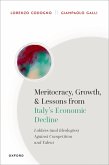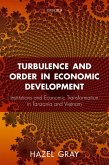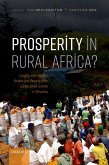Only a handful of economies have successfully transitioned from middle to high income in recent decades. One such case is Spain. How did it achieve this feat? Despite its relevance to countries that have yet to complete that transition, this question has attracted only limited attention. As a result, Spain's development into a prosperous society is a largely under-reported and often misunderstood success story. Unexpected Propserity takes a different look at the questions that usually frame the debate about Spain's economic development. Instead of asking why Spain's catching up was delayed, Calvo-Gonzalez asks how it happened in the first place; instead of focusing on how bad institutions undermined economic prospects, as the literature has done, he explains how growth took place even in the presence of poor institutions. This wider view opens new perspectives on Spain's development path. For example, comparisons are drawn not only with the richest countries but also with those that were in a similar stage of development as Spain. Drawing on a wide range of material, from archival sources to text analytics, the book provides a new account of why reforms were adopted, the role of external and internal factors, as well as that of unintended consequences. The result is an original interpretation of the economic rise of Spain that speaks also to the wider literature on the political economy of reform, the role of industrial and public policy more broadly, and the enduring legacy of political violence and conflict.
Dieser Download kann aus rechtlichen Gründen nur mit Rechnungsadresse in A, B, BG, CY, CZ, D, DK, EW, E, FIN, F, GR, HR, H, IRL, I, LT, L, LR, M, NL, PL, P, R, S, SLO, SK ausgeliefert werden.









